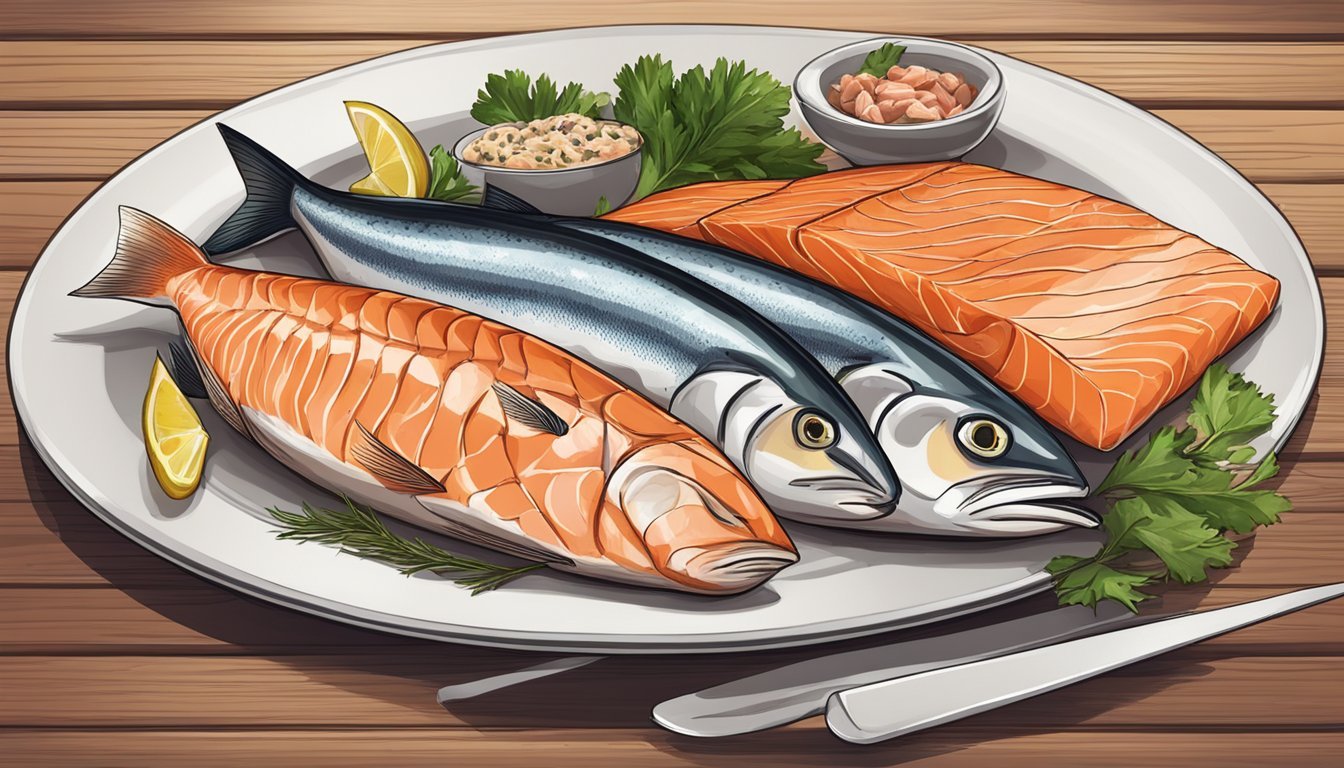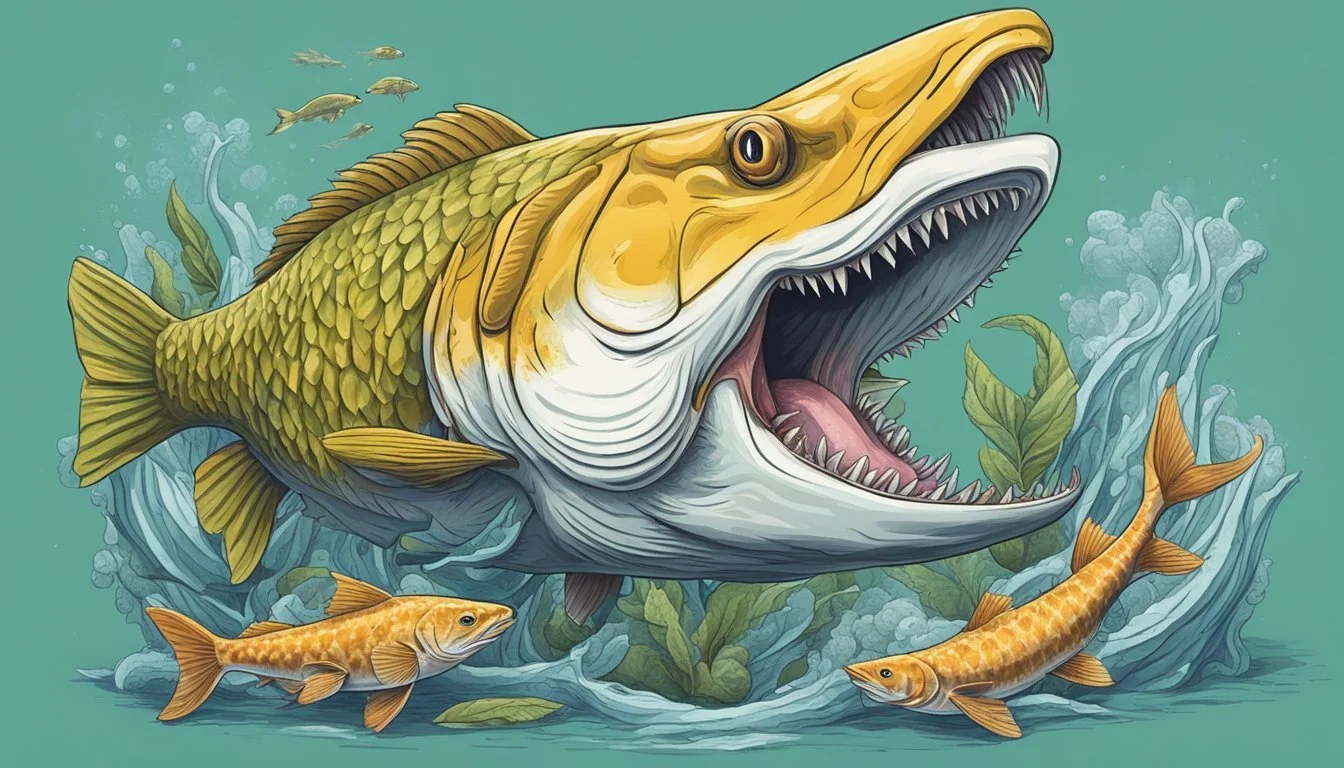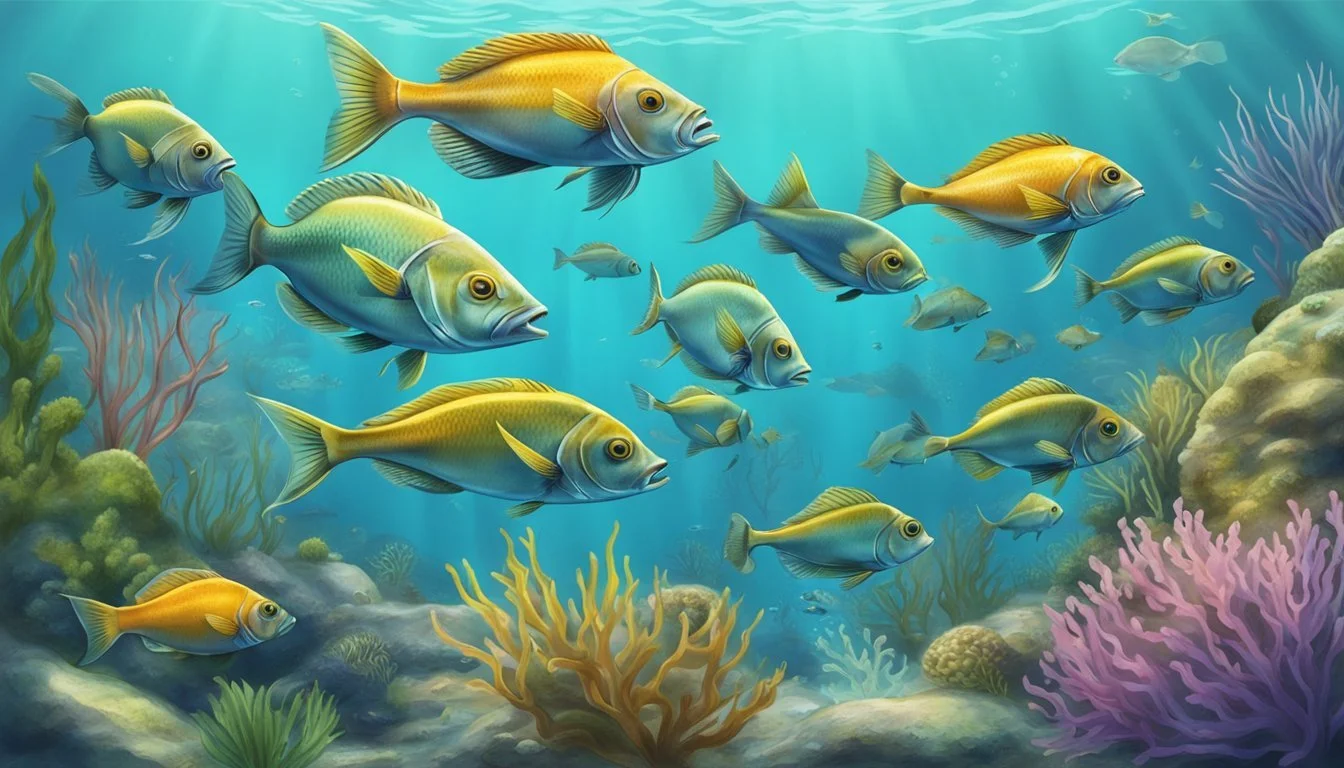Is Fish Allowed on Carnivore Diet?
Unveiling Dietary Inclusions
The carnivore diet, a regimen centered around the consumption of animal products, has gained considerable attention for its simplicity and purported health benefits. Proponents of the diet emphasize a menu exclusive to meat, poultry, and their byproducts, arguing that these foods provide all the necessary nutrients for the human body. The diet eliminates carbohydrates, dairy, and plant-based foods, positing that animal flesh and products are more in tune with human evolutionary nutritional needs.
Within the carnivore diet framework, fish (What wine goes well with fish?) is not only permitted but encouraged due to its high nutritional value. Fish, especially fatty varieties like salmon, are abundant in omega-3 fatty acids, which are essential for various bodily functions and can be difficult to obtain in adequate amounts from land-based animal sources alone. Including fish in the carnivore diet also expands the dietary options, offering a diverse range of flavors and textures, which can make this restrictive diet more palatable and sustainable for its followers.
Moreover, the ease of incorporating canned fish such as tuna or sardines adds a convenience factor to the carnivore diet. This allows adherents to maintain their dietary practices without fresh produce readily available, ensuring that the diet can be maintained even with a busy or on-the-go lifestyle. Despite the restrictive nature of the carnivore diet, such incorporation supports the inclusion of varied nutrient-rich foods within its strict boundaries.
Understanding the Carnivore Diet
The Carnivore Diet focuses on consuming exclusively animal products, emphasizing high-protein and zero-carb intake, often considered restrictive but associated with weight loss benefits.
Definition and Principles
The Carnivore Diet is a dietary regimen that requires individuals to consume only animal-based foods. Its core principles dictate a high intake of meats and other animal products while excluding all plant matter. This results in a high-protein, low-carb diet, excluding even dairy for some adherents based on individual tolerance. Most followers aim to enter a state of ketosis, similar to that of the ketogenic diet, albeit with zero carbohydrate intake, relying on animal fats and proteins for energy.
Comparison with Other Diets
The Carnivore Diet is often compared to other low-carb, high-protein diets, such as the ketogenic diet. However, the key distinction lies in its exclusion of all plant-based foods, making it considerably more restrictive.
Ketogenic Diet: Includes plant-based fats and a small amount of carbohydrates.
Paleo Diet: Allows for a broader range of whole foods, including fruits, vegetables, and nuts.
The Carnivore Diet is unique in that it eliminates the need for macronutrient counting, focusing solely on animal-based foods.
Role in Weight Loss
As a high-protein, low-carbohydrate diet, the Carnivore Diet can facilitate weight loss through several mechanisms. Protein has a high thermogenic effect and promotes satiety, which can reduce overall caloric intake. The absence of carbohydrates means the body must turn to fat for energy, potentially increasing fat oxidation and thereby supporting weight loss efforts. However, this diet eliminates fiber and many micronutrients found in plants, so individuals must ensure they meet their nutritional needs through varied animal products.
Foods to Eat on the Carnivore Diet
The carnivore diet focuses on sustaining oneself exclusively with animal products, emphasizing a variety of meats and animal-derived fat sources to meet nutritional needs.
Types of Meat and Animal Products
The foundation of the carnivore diet is a diverse array of animal meats. This includes:
Red Meat: staples such as beef, which is a rich source of protein and nutrients.
Poultry: including chicken, a leaner option that offers versatility in preparation.
Pork: another key component, often praised for its taste and nutrient density.
Organ Meats: such as liver and kidneys, which are dense in vitamins and minerals.
Consumers are encouraged to include a range of these meats to cover the spectrum of nutrients required for a balanced diet within the confines of carnivorous eating.
Inclusion of Fish in the Diet
Fish is not a mandatory aspect of the carnivore diet but is widely regarded as a beneficial inclusion due to its:
High-quality protein content.
Richness in omega-3 fatty acids, especially from fatty fish like salmon and mackerel.
Including fish can provide a broader range of nutrients and can contribute to the dietary goals of those on the carnivore diet.
Fat Sources
Fat is an essential source of energy on the carnivore diet, and it is important to consume adequate amounts to fuel the body. Individuals may rely on:
Saturated Fats: largely found in animal products such as lard.
Bone Marrow: a delicacy that is also a rich source of fat and nutrients.
The choice of fat sources should align with the need for high energy levels and an individual's personal health goals.
Make your life easier by ordering lard online; it's just a few clicks away!
Health Implications
When considering the incorporation of fish in a carnivore diet, two critical aspects emerge: the potential health benefits and the risks that require thoughtful consideration.
Potential Benefits
Omega-3 Fatty Acids: Fish is rich in omega-3 fatty acids, which are known to support heart health and reduce inflammation.
Essential Nutrients: They provide a range of essential nutrients, including vitamins and minerals vital for brain function and overall health.
Risks and Considerations
Cholesterol and Fats: Certain types of fish may be high in cholesterol and fats, which could impact blood sugar and heart disease risk.
Contaminants: Long-term consumption of certain fish species can introduce contaminants like mercury, which poses a risk to health.
Balance: A diet excluding plant-based fiber and nutrients might lead to chronic diseases, hence a balanced approach is imperative.
Customizing the Carnivore Diet
The Carnivore Diet is notably adaptable, allowing individuals to tailor their intake of animal-based foods according to personal preferences and nutritional goals.
Incorporating Variety
Individuals may enhance their Carnivore Diet by incorporating a range of meats and seafood to meet their dietary requirements. A variety of fish such as salmon, mackerel, tuna, sardines, and trout provide essential omega-3 fatty acids and are excellent protein sources. Seafood, in general, supplements the diet with key vitamins and minerals.
Salmon: Rich in omega-3s, suitable for grilling.
Mackerel: High in vitamin D, perfect for pan-frying.
Tuna: Lean protein, can be consumed steamed or seared.
Sardines: Contain calcium and vitamin B12, best eaten canned or fresh.
Trout: Source of B-vitamins, delicious when baked.
Meal Planning and Preparation
When crafting a meal plan, one can schedule various meats like lamb and bacon along with seafood and eggs to round out nutritional needs and keep meals exciting. Including dairy products such as butter and cheese adds flavor and provides another layer of fat content, which is pivotal in a zero-carb diet.
Sample meal:
Breakfast: Scrambled eggs with cheese and bacon.
Lunch: Grilled salmon with a side of bone broth.
Dinner: Roasted lamb chop seasoned with herbs.
For those who choose to include bone broth, it serves as a nutrient-dense drink that can supply collagen and other essential nutrients. This addition can particularly benefit joint health and digestion.
By planning meals that include a variety of animal-based foods, those on the Carnivore Diet can ensure they receive a broad spectrum of nutrients while enjoying different textures and flavors.
Challenges and Management
Adopting a carnivore diet poses distinctive nutritional challenges, while also requiring effective management strategies to optimize health outcomes. It is critical to ensure adequate intake of essential nutrients and to address potential side effects that may arise from this dietary transition.
Addressing Nutritional Gaps
Vitamins and Minerals
On a carnivore diet, an individual may experience a lack of certain vitamins and minerals typically found in plant-based foods. Key vitamins like Vitamin C and certain B vitamins, along with minerals such as magnesium and potassium, need special attention.
Vitamin C: It can be obtained in smaller amounts from organ meats.
B Vitamins: Liver is a good source of B vitamins, especially B12.
Magnesium and Potassium: One must include a variety of seafood and dairy, if tolerated, to ensure these mineral levels are met.
Avoid the crowds and shop for vitamin C, vitamin B12, magnesium, and potassium online from the comfort of your home!
Fiber
Fiber intake is typically associated with plant-based foods, and its absence in a carnivore diet might lead to digestive issues like constipation. To manage this:
Individuals can gradually reduce fiber intake to help the digestive system adjust.
Staying hydrated is crucial to help prevent constipation.
Experience the convenience and savings of buying fiber supplement online!
Managing Side Effects
Ketogenic Effects
A carnivore diet is inherently low in carbohydrates, often placing the body in a state of ketosis, similar to the ketogenic diet. Careful monitoring of blood sugar levels is essential, especially for those with diabetes.
Regular monitoring can help prevent adverse effects on blood sugar levels.
It is advisable to seek medical guidance when managing diabetes on a carnivore diet.
Mental Health
There are anecdotal reports of improvements in mental health conditions, such as depression, however, evidence is still emerging. Conversely, dietary changes can also impact mental health.
Individuals should monitor their mood and mental state closely.
Engagement with a healthcare professional is recommended to manage symptoms of depression or other mental health issues.
Dairy Intake
For some, including dairy can offer additional nutrients and variety on a carnivore diet. However, it may also present challenges:
Dairy can be included for those who tolerate it, to provide a source of fat and calcium.
Those with sensitivities may need to avoid dairy to prevent adverse reactions.
By staying vigilant about nutrient intake and potential side effects, individuals on a carnivore diet can proactively manage their health while navigating this dietary approach.
Lifestyle and Social Considerations
The carnivore diet, which includes fish, often necessitates significant lifestyle changes that can affect social dynamics and long-term sustainability. Adhering strictly to a diet of animal products can present challenges in social settings and may require careful consideration for sustainability and long-term health.
Navigating Social Situations
When someone adopts a carnivore diet, they may encounter difficulties in social situations where the available food options do not align with their dietary choices. For example, common social events like birthday parties or family gatherings typically offer a variety of foods, many of which are not compatible with a carnivore lifestyle. To manage this, individuals can:
Inform hosts in advance of their dietary restrictions.
Bring their own carnivore-approved dishes to share.
These strategies can help mitigate the impact on their social experiences and ensure they can participate without straying from their diet.
Sustainability and Long-Term Adherence
The sustainability of a carnivore diet, including fish, raises questions from a nutritional and environmental standpoint. A registered dietitian may caution about the potential lack of certain nutrients that are normally obtained from plant sources, and they might stress the importance of selecting sustainable fish sources such as line-caught salmon or farmed mussels.
For long-term adherence, individuals should consider:
The environmental impact of their diet and seek responsibly sourced fish.
The potential need for supplementation or regular health monitoring to address any nutritional gaps.
By addressing these concerns, individuals can better evaluate the sustainability and long-term health implications of maintaining a carnivore diet.
The Role of Fish in Nutritional Balance
In the context of a carnivore diet, fish is not merely permissible; it is a strategic choice for nutritional balance, providing key nutrients that support overall health.
Omega-3 Fatty Acids and Heart Health
Fish serves as an excellent source of omega-3 fatty acids, which are pivotal in maintaining heart health. The body cannot produce these fatty acids; they must be sourced from diet. Particularly, fatty fish like salmon, mackerel, and sardines are rich in eicosapentaenoic acid (EPA) and docosahexaenoic acid (DHA), types of omega-3s that are directly linked to cardiovascular benefits including reduced inflammation and lower blood pressure.
Salmon: High in EPA and DHA, beneficial for heart function.
Mackerel: Also abundant in omega-3, supporting anti-inflammatory processes.
Sardines: A compact source of EPA and DHA, promoting heart health.
Fish as a Source of Essential Nutrients
Fish is a powerhouse of vitamins and minerals essential for the human body. On a carnivore diet, it fulfills nutrient needs without incorporating plant-based sources. For instance, tuna is known for its vitamin D content, which is crucial for bone health and immune function, while trout is a good provider of B vitamins, vital for energy metabolism.
Vitamins: Fish such as salmon and trout offer Vitamins D and B12.
Minerals: Including Selenium and Iodine, key minerals for thyroid function and antioxidant defense are found abundantly in various fish.
By incorporating fish like tuna, salmon, trout, mackerel, and sardines into a carnivore diet, individuals not only get a rich profile of omega-3 fatty acids but also a variety of micronutrients that are instrumental for maintaining a well-rounded nutrient intake.
Philosophies and Controversies
The carnivore diet has sparked significant public debate due to its exclusionary principles, with both staunch advocates and vocal critics contributing to the controversy. Ethical considerations also play a role in the discourse.
Prominent Advocates of the Carnivore Diet
Shawn Baker, a reputed proponent of the carnivore diet, asserts that including animal products, such as fish, is not only acceptable but beneficial. He references the diet's potential in managing autoimmune conditions and improving overall health. Baker emphasizes the importance of animal products for their nutrient density and suggests that the diet's simplicity aids in adherence and digestive health.
Critiques and Counterarguments
Conversely, the diet faces criticism from nutritionists and environmentalists who raise concerns about its sustainability and potential nutritional deficiencies. Critics argue that such a restrictive diet may exclude essential phytonutrients and fiber found in plant foods, which are important for long-term health. Ethical considerations also surface with debates around the environmental impact of a meat-heavy diet and animal welfare. The public debate continues, as the diet withstands scrutiny from both well-established nutritional guidelines and evolving dietary philosophies.
Conclusion
In the context of the carnivore diet, incorporating fish as a regular component is not only permitted but also beneficial for maintaining nutritional balance. Fish provides essential nutrients that are critical for health, including high-quality protein, omega-3 fatty acids, vitamins, and minerals.
Nutritional Benefits:
Protein: Serves as the building block for muscles and tissues.
Omega-3 Fatty Acids: Promote cardiovascular health and cognitive function.
Vitamins and Minerals: Support immune system, bone health, and metabolic processes.
Individuals following the carnivore diet can gain these nutritional advantages by adding fish to their meal plan. This addresses potential gaps in micronutrients that could be missing from a diet solely relying on terrestrial animal sources.
Lifestyle Considerations:
Palette Diversity: Fish provides a varied flavor profile.
Ease of Preparation: Many fish dishes require minimal cooking time.
The adoption of fish into one's diet aligns with lifestyle choices on the carnivore diet, aiding in both simplicity and enjoyment of meals without compromising the diet's principles. It allows for greater diversity in meal planning, making adherence to the dietary regimen more sustainable in the long term, and possibly reducing the monotonous nature of eating only land-animal products.
In summary, fish is compatible with the carnivore diet as they are an excellent source of nutrients that may complement the nutrient profile of other animal products, highlight the importance of choosing a variety of animal-based foods to meet one's health requirements, and align with lifestyle needs.














